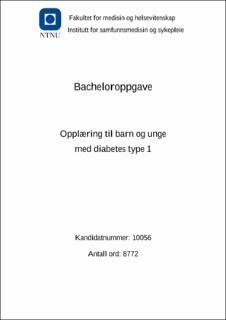| dc.contributor.advisor | Hustad, Brit | |
| dc.contributor.author | Engås, Kristin Tennfjord | |
| dc.date.accessioned | 2020-07-29T16:00:27Z | |
| dc.date.available | 2020-07-29T16:00:27Z | |
| dc.date.issued | 2020 | |
| dc.identifier.uri | https://hdl.handle.net/11250/2670421 | |
| dc.description.abstract | Tittel: Opplæring til barn og unge med diabetes type 1.
Hensikt: Utforske og opparbeide kunnskap om hvordan sykepleier kan gi god opplæring og støtte til barn og unge med nyoppdaget diabetes type 1, gjennom å undersøke forskning og litteratur på området.
Problemstilling: ”Hvordan kan man som sykepleier gi god opplæring og støtte til barn og unge med nyoppdaget diabetes type 1, for å oppnå en best mulig livskvalitet og minimere senkomplikasjoner?”
Metode: Oppgaven er skrevet som en systematisk litteraturstudie. Forskningsartikler, pensumlitteratur og andre skriftlige kilder som kan belyse problemstillingen, har blitt innhentet og analysert.
Resultat: Sykepleiere har en veldig viktig rolle i opplæringen av diabetespasienter både i den første tiden på sykehus og i den senere oppfølgingen.
Konklusjon: For å kunne gi god opplæring og støtte trenger sykepleierne kunnskap om sykdommen, relasjonell og pedagogisk kompetanse i hensyn til barns alder, utvikling, personlighet og sosiale forhold, og de bør ta i bruk gode, kvalitetssikrede undervisnings-opplegg. | |
| dc.description.abstract | Title: Education for children and adolescents with type 1 diabetes.
Purpose: To explore and develop knowledge regarding how nurses can provide good education and support to children and adolescents with newly diagnosed type 1 diabetes, by examining research and literature in the field.
Problem statement: "How can nurses provide good education and support to children and adolescents with newly diagnosed type 1 diabetes, in order to achieve best possible quality of life and minimize late term complications?"
Method: The thesis is written as a systematic literature study. Research articles, literature and other written sources that can illustrate the problem have been collected and analyzed.
Result: Nurses have a very important role in the education of diabetic patients both during the first time in hospital and in the subsequent follow-up.
Conclusion: In order to provide good education and support, the nurses need knowledge of the disease, relational and educational competence regard to children's age, development, personality and social conditions, and they should employ good, quality assured teaching programs. | |
| dc.publisher | NTNU | |
| dc.title | Opplæring til barn og unge med diabetes type 1 | |
| dc.type | Bachelor thesis | |
